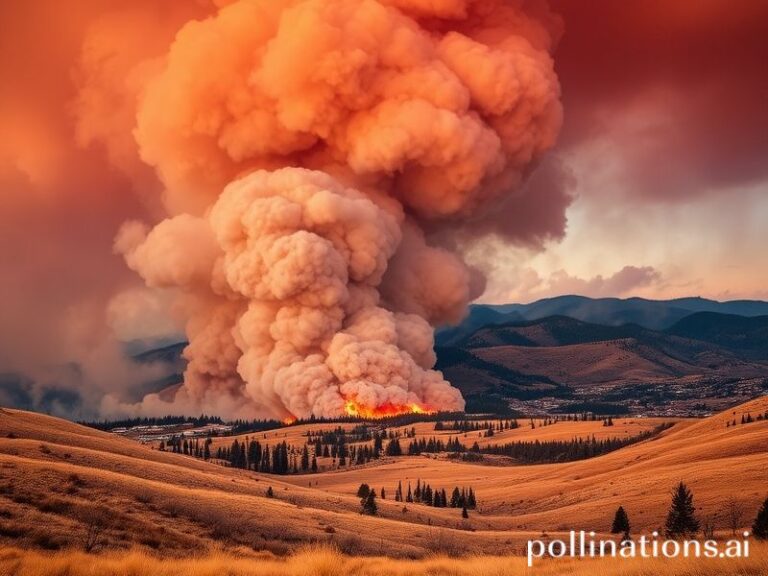Earth’s Passive-Aggressive Newsletter: A Sardonic Global Tour of Geo-News
**The Earth Shrugs: A Planet-Wide Round-Up of Geo-News for the Perpetually Jet-Lagged**
By the time your breakfast coffee cools, some volcano you can’t pronounce has canceled 4,000 flights, a micro-plastic the size of Malta has been discovered in a penguin’s pancreas, and a previously unheard-of island has been hastily added to Google Maps after a Chinese dredger sneezed. Welcome to geo-news—geography’s daily reminder that the planet is a restless roommate who refuses to pick up after itself.
Let’s start where everything supposedly begins: the Pacific Ring of Fire, Earth’s own mosh pit. Indonesia’s Mount Marapi coughed up a 3-kilometer ash plume last Tuesday, gifting respiratory souvenirs to three provinces and reminding Singapore’s finance bros that “risk” isn’t just a spreadsheet cell. Meanwhile, 5,000 kilometers north, Japan’s Meteorological Agency politely warned that the Nankai Trough is “80 % ready for its next big shimmy,” the bureaucratic equivalent of saying, “Please evacuate, but no rush.” If the trough snaps, estimates suggest USD 7 trillion in damages—roughly the GDP of France, or what Elon Musk misplaces between couch cushions.
Cross the dateline and the Pacific is busy trademarking irony: California—parched for a decade—just declared its first “ tropical storm watch” as Hurricane Hilary sashayed up the usually arid Baja. Nothing says “climate whiplash” like sandbags on Sunset Boulevard. Over in the Atlantic, Spain’s Canary Islands recorded a record 42 °C ocean temperature, turning the surrounding sea into the world’s largest unintentional paella pan and cooking 3,000 kilograms of sardines to death. Local officials called it “unprecedented”; everyone else called it Tuesday.
Glide eastward and the Arctic is serving its usual existential cocktail: 2023’s summer sea-ice minimum tied 2016’s runner-up status, which scientists translate as “We’re not last, but the house is still on fire.” Russia, ever the gracious host, responded by parking another nuclear-powered icebreaker at the North Pole—because nothing soothes a warming planet like Chernobyl-on-skis. Denmark, not to be outdone, announced a USD 5 million program to teach Greenlanders to farm potatoes. If you can’t beat the melt, apparently, you monetize the fries.
Africa’s tectonic gossip is equally festive. The East African Rift—basically Earth’s way of unzipping a new ocean—widened another 6 millimeters this year. That’s half a fingernail, or, in bureaucratic time, enough for the UN to convene three workshops and produce a glossy PDF no one will read. Ethiopia is already auctioning off future beachfront property in the Afar Triangle, marketing it as “ Dubai-adjacent, only 3 million years away.” Early investors include a Dubai prince, because poetic justice writes itself.
Europe, meanwhile, is discovering that rivers can file for unemployment. The Rhine—once the continent’s aqueous autobahn—hit record lows last week, grounding freight and forcing the Dutch to confront a horrifying prospect: actually driving their bicycles somewhere. In Serbia, the Danube dropped so far that a World War II German warship resurfaced like an unwelcome Tinder date. Local authorities are debating whether to remove the unexploded ordnance or simply charge admission.
And let’s not ignore the digital crust we’ve slapped atop the physical one. Google’s freshly updated “Global Heat Layer” (not the official name, but we’re trademarking it) shows that 40 % of the planet’s population experienced a simultaneous heatwave this July—an achievement previously thought impossible without a giant magnifying glass wielded by a vengeful toddler. The same dataset reveals that nighttime temperatures are rising twice as fast as daytime, proving that even the dark can’t catch a break in late-stage capitalism.
So what does it all mean, beyond fodder for doom-scroll addiction? Simply that geography has become the world’s most passive-aggressive newsroom, filing stories in wildfires, sea levels, and tectonic sighs. Nations scramble to monetize meltwater, weaponize trade routes, or rebrand disasters as “experience tourism,” while citizens practice the universal ritual of refreshing their screens and wondering if tomorrow’s commute will require a canoe, a respirator, or a passport to the nearest climate colony.
The broader significance is as elegant as it is brutal: borders are imaginary, but watersheds don’t do visas. Every belch of magma, every shift in monsoon timing, is a reminder that Earth’s operating system predates our user agreements—and it updates whether you click “accept” or not. Humanity’s grand strategy so far? A collective shrug emoji followed by a pledge to recycle slightly harder. Call it geo-news, call it planetary satire, just don’t call it unexpected. The Earth has been publishing for 4.5 billion years; we’re merely the latest comments section—angry, poorly informed, and hilariously outranked.







